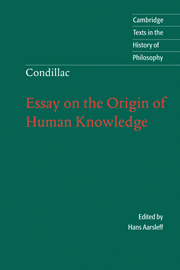Book contents
- Frontmatter
- Contents
- Acknowledgments
- List of abbreviations
- Introduction
- Chronology
- Further reading
- Note on the text and translation
- Essay on the Origin of Human Knowledge
- Introduction
- PART I The materials of our knowledge and especially the operations of the soul
- Section 1
- Section 2 Analysis and generation of the operations of the soul
- Section 3 Simple and complex ideas
- Section 4
- Section 5 Abstractions
- Section 6 Some judgments that have been erroneously attributed to the mind, or the solution of a metaphysical problem
- PART II Language and method
- Index
- Cambridge texts in the history of philosophy
Section 2 - Analysis and generation of the operations of the soul
Published online by Cambridge University Press: 05 June 2012
- Frontmatter
- Contents
- Acknowledgments
- List of abbreviations
- Introduction
- Chronology
- Further reading
- Note on the text and translation
- Essay on the Origin of Human Knowledge
- Introduction
- PART I The materials of our knowledge and especially the operations of the soul
- Section 1
- Section 2 Analysis and generation of the operations of the soul
- Section 3 Simple and complex ideas
- Section 4
- Section 5 Abstractions
- Section 6 Some judgments that have been erroneously attributed to the mind, or the solution of a metaphysical problem
- PART II Language and method
- Index
- Cambridge texts in the history of philosophy
Summary
The operations of the soul can be divided in two sorts, depending on whether they are referred more specifically to the understanding or to the will. The object of this essay makes it clear that I propose to consider them only by the relation they have to the understanding.
I shall not limit myself to giving definitions. I intend to try and envisage them in a clearer light than has hitherto been the case. The point is to examine their progress and to see how they are all generated from a single starting point which is nothing but a simple perception. This examination is by itself more useful than all the rules of the logicians. Indeed, could we be ignorant of the right way of conducting the operations of the soul if we knew well how they are generated? But this entire part of metaphysics has so far been in such a state of chaos that I have been obliged somehow to make a new language for myself. I did not find it possible to combine precision with signs that are as ill determined as they are in common usage. All the same, it will be easier to understand me for those who will read me with attention.
Perception, consciousness, attention, and reminiscence
§I The perception or the impression occasioned in the mind by the action of the senses is the first operation of the understanding. The idea of it cannot be caused by any form of discourse. It can be supplied only by reflection on what we experience when we are affected by some sensation.
- Type
- Chapter
- Information
- Condillac: Essay on the Origin of Human Knowledge , pp. 19 - 70Publisher: Cambridge University PressPrint publication year: 2001



